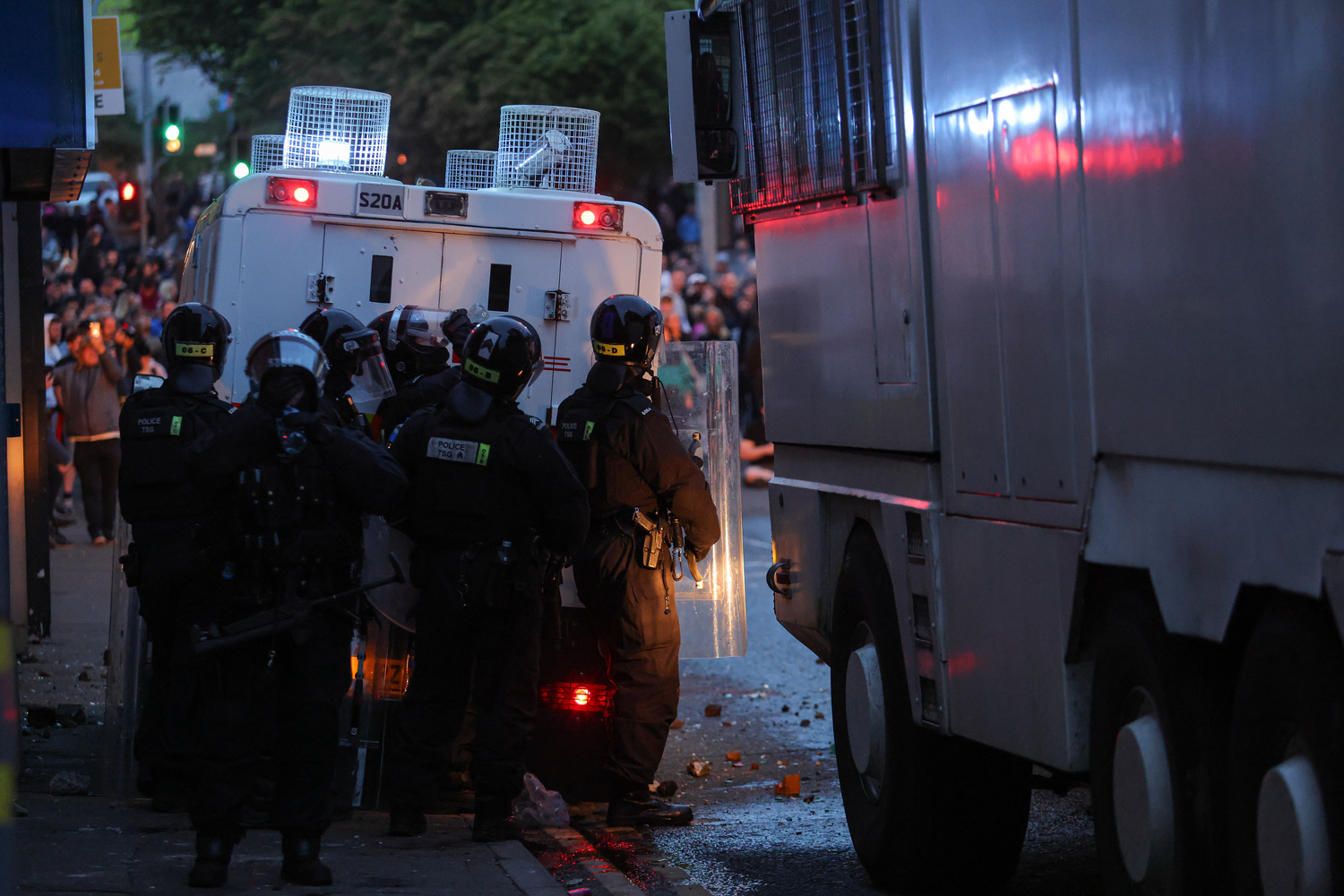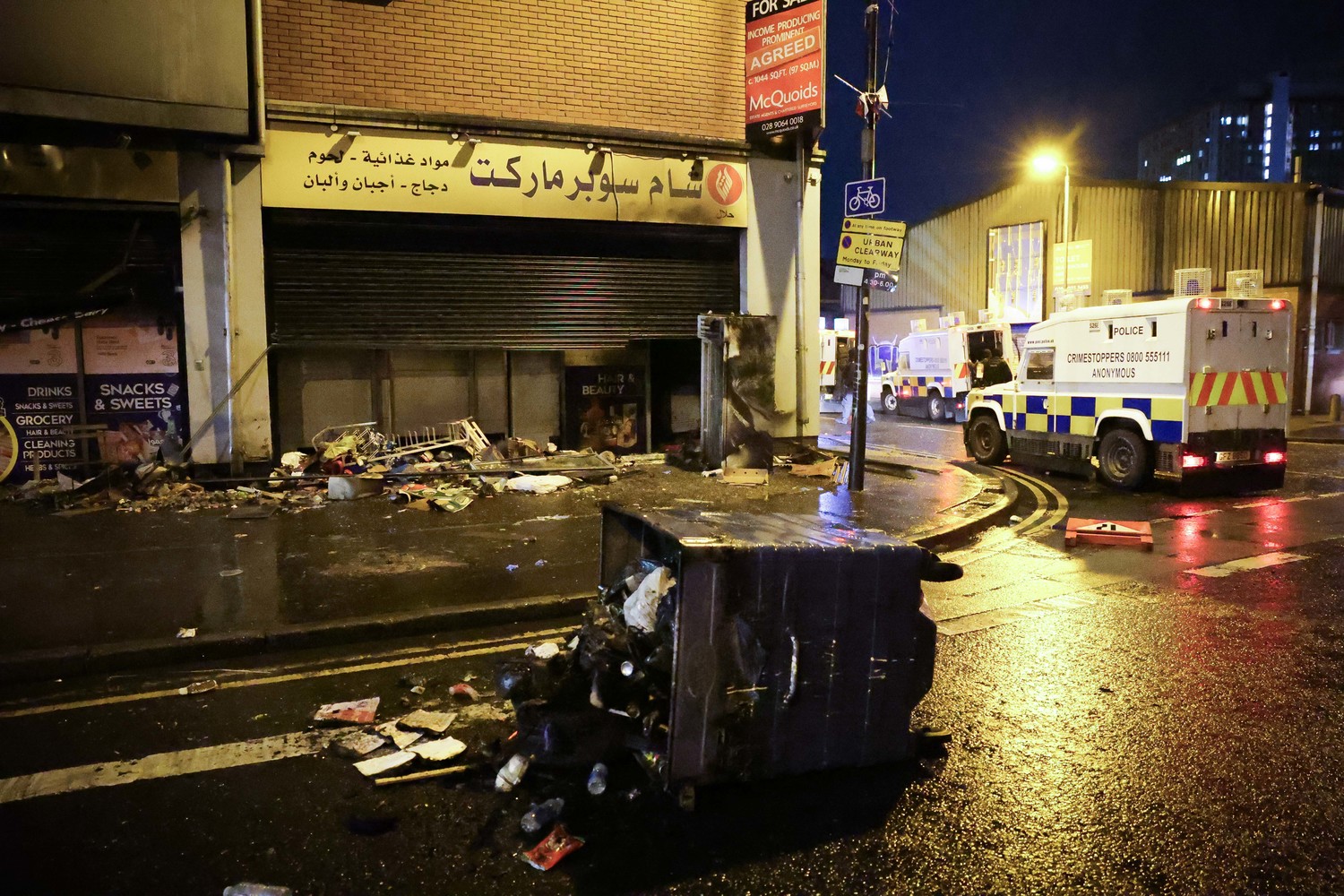
The PSNI warned of a “high potential for disorder, violence and vigilantism.” Photo of Ballymena riots by Press Eye
Northern Ireland faces a “permacrisis” from recurring race riots and may need to use military bases to shelter people burnt out of their homes, government documents reveal.
The warnings, uncovered by The Detail through multiple Freedom of Information (FOI) requests, were shared in hundreds of internal emails, meeting notes, and briefing documents exchanged between civil servants across departments during the summer.
Officials expressed concern that racial violence seen in Ballymena, Larne, and Belfast could intensify – with one incident, either local or international, triggering widespread disorder.
“This is a permacrisis situation due to the recurring nature of public unrest,” an Executive Office official wrote during a high-level, multi-agency meeting with the PSNI in early July.
Another internal briefing warned of “high potential for disorder, violence and vigilantism,” and that ethnic minorities “feel unwelcome across NI.”
‘Failure to protect'
The documents show that government departments and local councils have already struggled to meet the needs of displaced families during the summer.
Following the attack on Larne leisure centre, authorities warned they would struggle to provide safe emergency accommodation if renewed unrest erupts and suggested using military bases to house displaced families.
“Support centre locations cannot be shared,” a Department for Communities official wrote. “These concerns could reduce the ability to open centres due to staff fears – realistically (my view) secure MOD sites might be only option.”
The PSNI also examined the possibility of using police bases to house displaced families during the June violence.
The public housing register was taken offline for at least six weeks, in case they could be used to identify migrant households. Last year, foreign health workers were offered personal safety alarms, security escorts, and police “reassurance patrols”.
The riots subsided in mid-June, averting need for any Ministry of Defence or police sites.
But officials from Mid and East Antrim Council, which covers Ballymena and Larne, wrote that if the situation escalates again they “will struggle to comply with (our) obligations to establish rest centres."
Geraldine Hanna, the Northern Ireland Commissioner for Victims of Crime, said the revelations were "deeply distressing and demand urgent, coordinated action."
“These are not just operational challenges; they are indicators of a broader failure to protect the rights and safety of minority communities.”
Ongoing
Race hate crimes in Northern Ireland are at their highest level since records began in 2004. PSNI figures show 1,329 race-motivated incidents were recorded in the year to June 2025.
In Ballymena, where some of the most intense unrest occurred, the BBC recently reported that 60% of Roma families had left the area.
Jim Allister, TUV leader and North Antrim MP, was quoted in the article as saying that the “exodus” has “transformed the feel in the area. There's no longer people standing around our street corners here.”
Protests are still ongoing in Ballymena with homes of foreign nationals targeted, a police officer told Ballymena Magistrates' Court in late August, while vigilantes continue to roam Belfast targeting ethnic minorities.
A spokesperson for the Executive Office said authorities had established a Strategic Co-ordination Group and Recovery Co-ordination Group for a “joined up” effort to mitigate the risk of further civil unrest and improve community relations.
“Work to tackle racism and hate is a key part of our wider good relations work to build a more inclusive place for everyone.”

Shops were destroyed and police came under attack during disorder in south Belfast in August 2024. Photo by Kelvin Boyes, Press Eye
Children
Correspondence also shows the profound effect the riots have had both local and newcomer children.
In both August 2024 and June 2025 riots, unaccompanied asylum seeker children in the care of health trusts were forced from their homes, while others were moved “pre-emptively” for their safety.
They were advised to lock doors and windows, to keep their phone charged, and follow other security measures.
Schools near the areas of unrest in June also faced significant impacts on attendance and the wellbeing of pupils, according to correspondence from the Department of Education.
Both ‘newcomer’ and ‘local’ pupils were not attending, the emails showed.
Schools reported that children who did attend school were “showing signs of traumatisation having witnessed the fires,” and that “many of them are being impacted by the sheer noise of sirens and helicopters".
Many of the children who are still in school are “very concerned about their friends” who have been displaced.
The full impact may not be known until the new year starts in September, as "schools are aware that families have left the area and through local knowledge are led to believe that they have either left or will be leaving the country with no certainty of a return.”
Patrick Corrigan, Amnesty International’s Northern Ireland director, said the documents showed the “terrifying impact” of racist violence.
“Given the escalating danger of further racist disorder, it is now urgent for political leaders, police and other statutory agencies to come together to ensure people’s safety from further racist violence,” he said.
“The likelihood of more racist violence seems certain. What is less clear is whether the Northern Ireland authorities are ready to step up to keep people safe.”
Ms Hanna, the Commissioner for Victims of Crime, said the displacement of vulnerable people, especially children, was deeply distressing and required urgent action.
“The events in August 2024 and June 2025 were not isolated incidents but part of a disturbing pattern of violence and intimidation that has left many victims traumatised and entire communities living in fear.”
Ms Hanna called for a rapid, independent review, after the August riots with oversight from individuals trusted by ethnic minority communities. However, the Executive Office did not take this forward.
“We must now ask: What has been learned? What has changed? And what will be done differently?”, she added.
 By
By